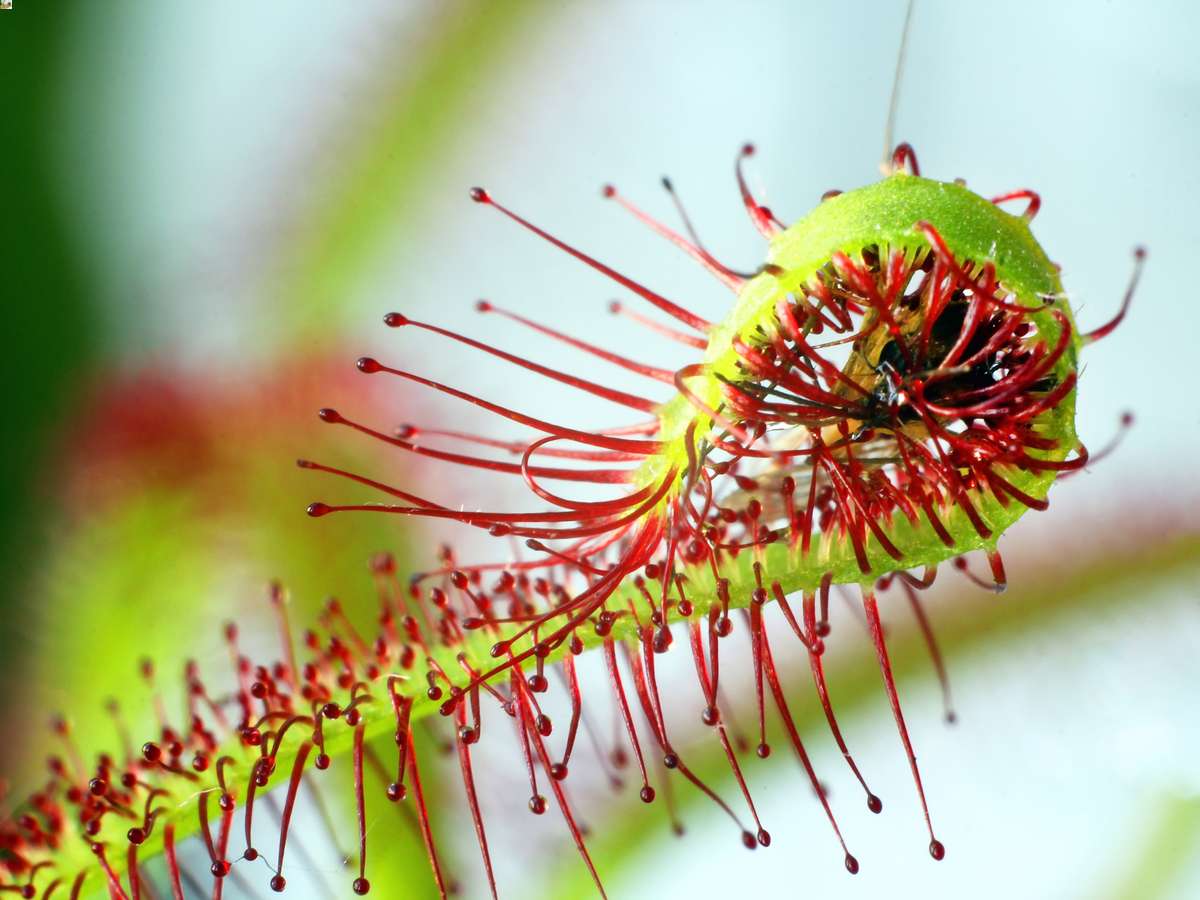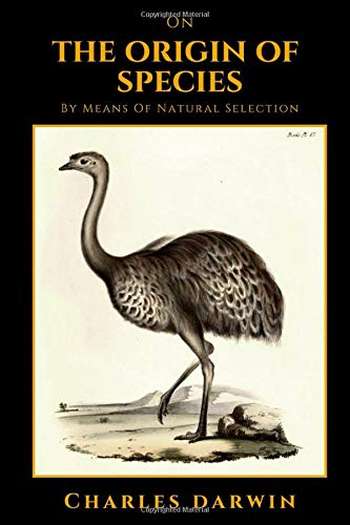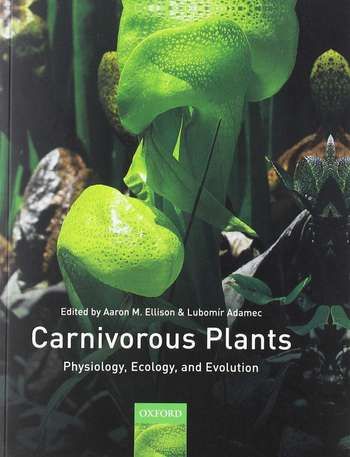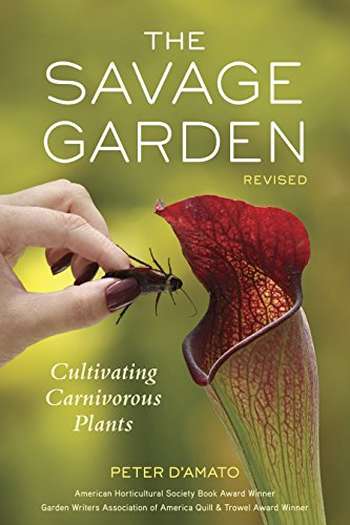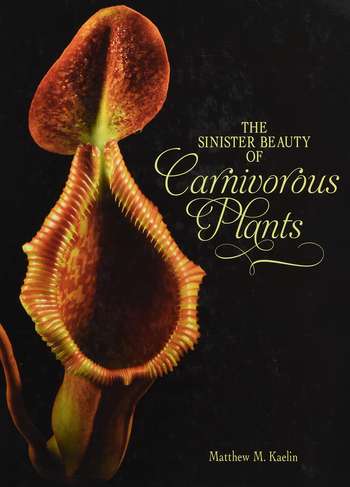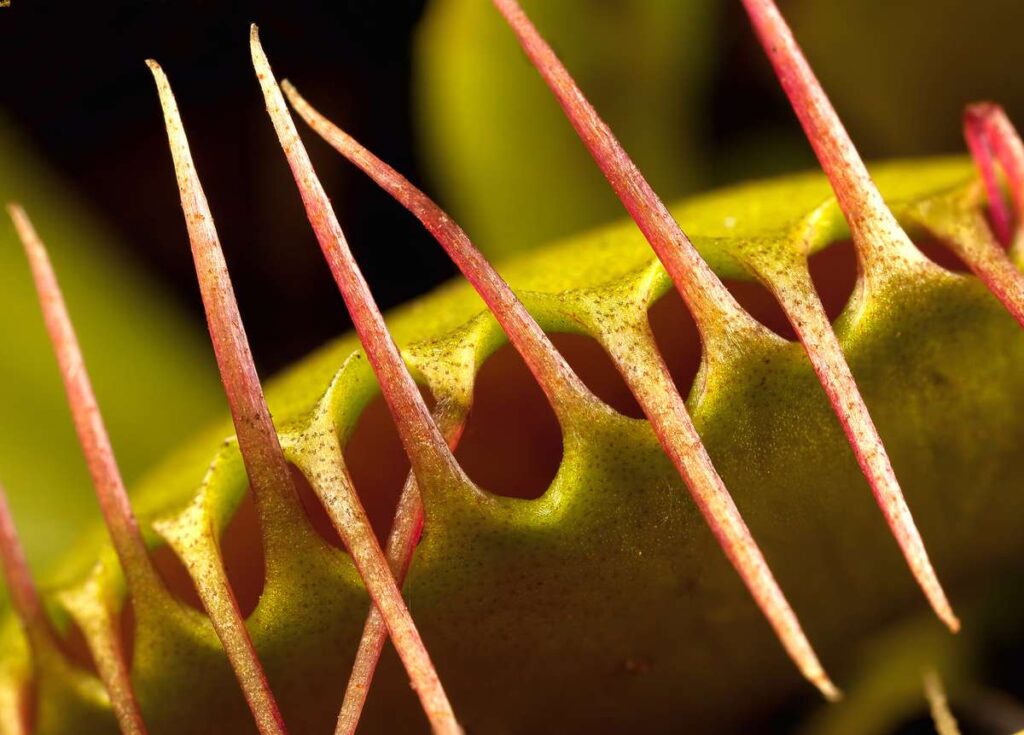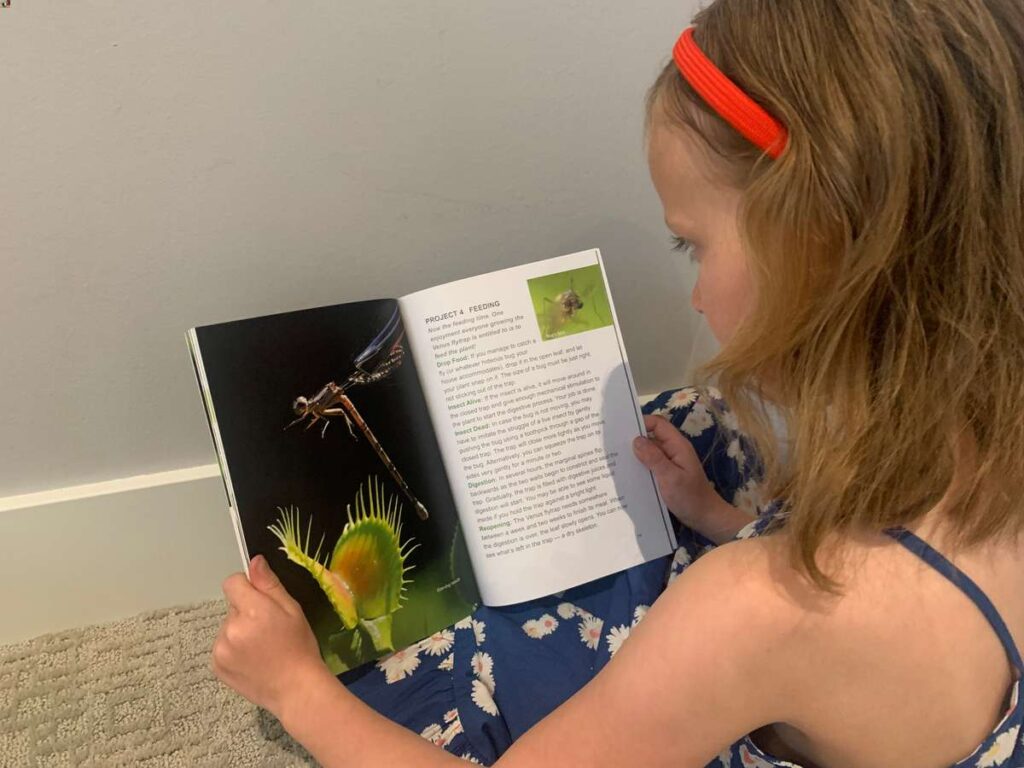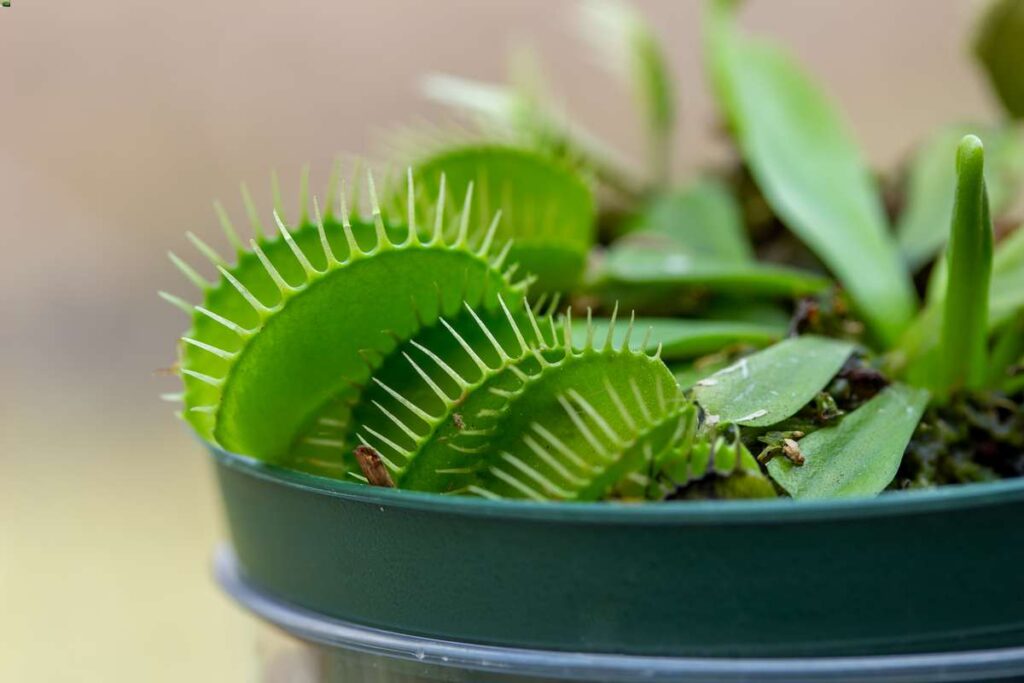Welcome carnivorous plant fans! This free, illustrated version of Chapter 2 of Insectivorous Plants by Charles Darwin has been lightly edited to be more internet friendly. The main text of Chapter 2 of Insectivorous Plants is presented here in its entirety; we have simply removed some of the table of contents material, created more white space for easier reading, added a color picture or two, etc.
We hope you enjoy this free, online version of the Charles Darwin book Insectivorous Plants, Chapter 2.
This post contains compensated links.
CHAPTER 2
THE MOVEMENTS OF THE TENTACLES FROM THE CONTACT OF SOLID BODIES
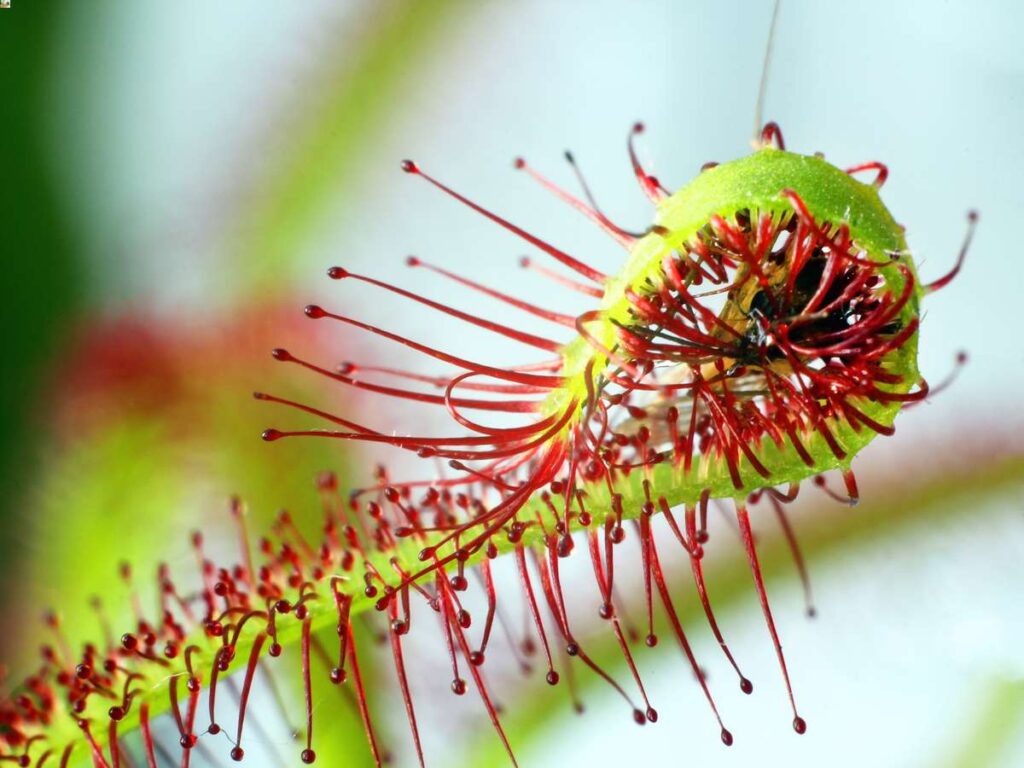
Insectivorous Plants – Chapter 2 Topics:
- Inflection of the exterior tentacles owing to the glands of the disc being excited by repeated touches, or by objects left in contact with them
- Difference in the action of bodies yielding and not yielding soluble nitrogenous matter
- Inflection of the exterior tentacles directly caused by objects left in contact with their glands
- Periods of commencing inflection and of subsequent re-expansion
- Extreme minuteness of the particles causing inflection
- Action under water
- Inflection of the exterior tentacles when their glands are excited by repeated touches
- Falling drops of water do not cause inflection
I WILL give in this and the following chapters some of the many experiments made, which best illustrate the manner and rate of movement of the tentacles, when excited in various ways. The glands alone in all ordinary cases are susceptible to excitement. When excited, they do not themselves move or change form, but transmit a motor impulse to the bending part of their own and adjoining tentacles, and are thus carried towards the centre of the leaf.
Strictly speaking, the glands ought to be called irritable, as the term sensitive generally implies consciousness; but no one supposes that the Sensitive-plant is conscious, and as I have found the term convenient, I shall use it without scruple. I will commence with the movements of the exterior tentacles, when indirectly excited by stimulants applied to the glands of the short tentacles on the disc.
The exterior tentacles may be said in this case to be indirectly excited, because their own glands are not directly acted on. The stimulus proceeding from the glands of the disc acts on the bending part of the exterior tentacles, near their bases, and does not (as will hereafter be proved) first travel up the pedicels to the glands, to be then reflected back to the bending place.
Nevertheless, some influence does travel up to the glands, causing them to secrete more copiously, and the secretion to become acid. This latter fact is, I believe, quite new in the physiology of plants; it has indeed only recently been established that in the animal kingdom an influence can be transmitted along the nerves to glands, modifying their power of secretion, independently of the state of the blood-vessels.
The Inflection of the Exterior Tentacles from the Glands of the Disc being excited by Repeated Touches, or by Objects left in Contact with them.
The central glands of a leaf were irritated with a small stiff camel-hair brush, and in 70 m. (minutes) several of the outer tentacles were inflected; in 5 hrs. (hours) all the sub-marginal tentacles were inflected; next morning after an interval of about 22 hrs. they were fully re-expanded.
In all the following cases the period is reckoned from the time of first irritation. Another leaf treated in the same manner had a few tentacles inflected in 20 m.; in 4 hrs. all the submarginal and some of the extreme marginal tentacles, as well as the edge of the leaf itself, were inflected; in 17 hrs. they had recovered their proper, expanded position.
I then put a dead fly in the centre of the last-mentioned leaf, and next morning it was closely clasped; five days afterwards the leaf re-expanded, and the tentacles, with their glands surrounded by secretion, were ready to act again.
Particles of meat, dead flies, bits of paper, wood, dried moss, sponge, cinders, glass, &c., were repeatedly placed on leaves, and these objects were well embraced in various periods from one hr. to as long as 24 hrs., and set free again, with the leaf fully re-expanded, in from one or two, to seven or even ten days, according to the nature of the object.
On a leaf which had naturally caught two flies, and therefore had already closed and reopened either once or more probably twice, I put a fresh fly: in 7 hrs. it was moderately, and in 21 hrs. thoroughly well, clasped, with the edges of the leaf inflected. In two days and a half the leaf had nearly re-expanded; as the exciting object was an insect, this unusually short period of inflection was, no doubt, due to the leaf having recently been in action.
Allowing this same leaf to rest for only a single day, I put on another fly, and it again closed, but now very slowly; nevertheless, in less than two days it succeeded in thoroughly clasping the fly.
When a small object is placed on the glands of the disc, on one side of a leaf, as near as possible to its circumference, the tentacles on this side are first affected, those on the opposite side much later, or, as often occurred, not at all.
This was repeatedly proved by trials with bits of meat; but I will here give only the case of a minute fly, naturally caught and still alive, which I found adhering by its delicate feet to the glands on the extreme left side of the central disc.
The marginal tentacles on this side closed inwards and killed the fly, and after a time the edge of the leaf on this side also became inflected, and thus remained for several days, whilst neither the tentacles nor the edge on the opposite side were in the least affected.
If young and active leaves are selected, inorganic particles not larger than the head of a small pin, placed on the central glands, sometimes cause the outer tentacles to bend inwards. But this follows much more surely and quickly, if the object contains nitrogenous matter which can be dissolved by the secretion.
On one occasion I observed the following unusual circumstance. Small bits of raw meat (which acts more energetically than any other substance), of paper, dried moss, and of the quill of a pen were placed on several leaves, and they were all embraced equally well in about 2 hrs.
On other occasions the above-named substances, or more commonly particles of glass, coal-cinder (taken from the fire), stone, gold-leaf, dried grass, cork, blotting-paper, cotton-wool, and hair rolled up into little balls, were used, and these substances, though they were sometimes well embraced, often caused no movement whatever in the outer tentacles, or an extremely slight and slow movement.
Yet these same leaves were proved to be in an active condition, as they were excited to move by substances yielding soluble nitrogenous matter, such as bits of raw or roast meat, the yolk or white of boiled eggs, fragments of insects of all orders, spiders, &c. I will give only two instances.
Minute flies were placed on the discs of several leaves, and on others balls of paper, bits of moss and quill of about the same size as the flies, and the latter were well embraced in a few hours; whereas after 25 hrs. only a very few tentacles were inflected over the other objects. The bits of paper, moss, and quill were then removed from these leaves, and bits of raw meat placed on them; and now all the tentacles were soon energetically inflected.
Again, particles of coal-cinder (weighing rather more than the flies used in the last experiment) were placed on the centres of three leaves: after an interval of 19 hrs. one of the particles was tolerably well embraced; a second by a very few tentacles; and a third by none.
I then removed the particles from the two latter leaves, and put on them recently killed flies. These were fairly well embraced in 7 1/2 hrs. and thoroughly after 20 1/2 hrs.; the tentacles remaining inflected for many subsequent days.
On the other hand, the one leaf which had in the course of 19 hrs. embraced the bit of cinder moderately well, and to which no fly was given, after an additional 33 hrs. (i.e. in 52 hrs. from the time when the cinder was put on) was completely re-expanded and ready to act again.
From these and numerous other experiments not worth giving, it is certain that inorganic substances, or such organic substances as are not attacked by the secretion, act much less quickly and efficiently than organic substances yielding soluble matter which is absorbed.
Moreover, I have met with very few exceptions to the rule, and these exceptions apparently depended on the leaf having been too recently in action, that the tentacles remain clasped for a much longer time over organic bodies of the nature just specified than over those which are not acted on by the secretion, or over inorganic objects.*
* Owing to the extraordinary belief held by M. Ziegler (‘Comptes rendus,’ May 1872, p. 122), that albuminous substances, if held for a moment between the fingers, acquire the property of making the tentacles of Drosera contract, whereas, if not thus held, they have no such power, I tried some experiments with great care, but the results did not confirm this belief. Red-hot cinders were taken out of the fire, and bits of glass, cotton-thread, blotting paper and thin slices of cork were immersed in boiling water; and particles were then placed (every instrument with which they were touched having been previously immersed in boiling water) on the glands of several leaves, and they acted in exactly the same manner as other particles, which had been purposely handled for some time. Bits of a boiled egg, cut with a knife which had been washed in boiling water, also acted like any other animal substance. I breathed on some leaves for above a minute, and repeated the act two or three times, with my mouth close to them, but this produced no effect. I may here add, as showing that the leaves are not acted on by the odour of nitrogenous substances, that pieces of raw meat stuck on needles were fixed as close as possible, without actual contact, to several leaves, but produced no effect whatever. On the other hand, as we shall hereafter see, the vapours of certain volatile substances and fluids, such as of carbonate of ammonia, chloroform, certain essential oils, &c., cause inflection. M. Ziegler makes still more extraordinary statements with respect to the power of animal substances, which have been left close to, but not in contact with, sulphate of quinine. The action of salts of quinine will be described in a future chapter. Since the appearance of the paper above referred to, M. Ziegler has published a book on the same subject, entitled ‘Atonicit et Zoicit,’ 1874.)
The Inflection of the Exterior Tentacles as directly caused by Objects left in Contact with their Glands.
I made a vast number of trials by placing, by means of a fine needle moistened with distilled water, and with the aid of a lens, particles of various substances on the viscid secretion surrounding the glands of the outer tentacles.
I experimented on both the oval and long-headed glands. When a particle is thus placed on a single gland, the movement of the tentacle is particularly well seen in contrast with the stationary condition of the surrounding tentacles. (See previous fig. 6.)
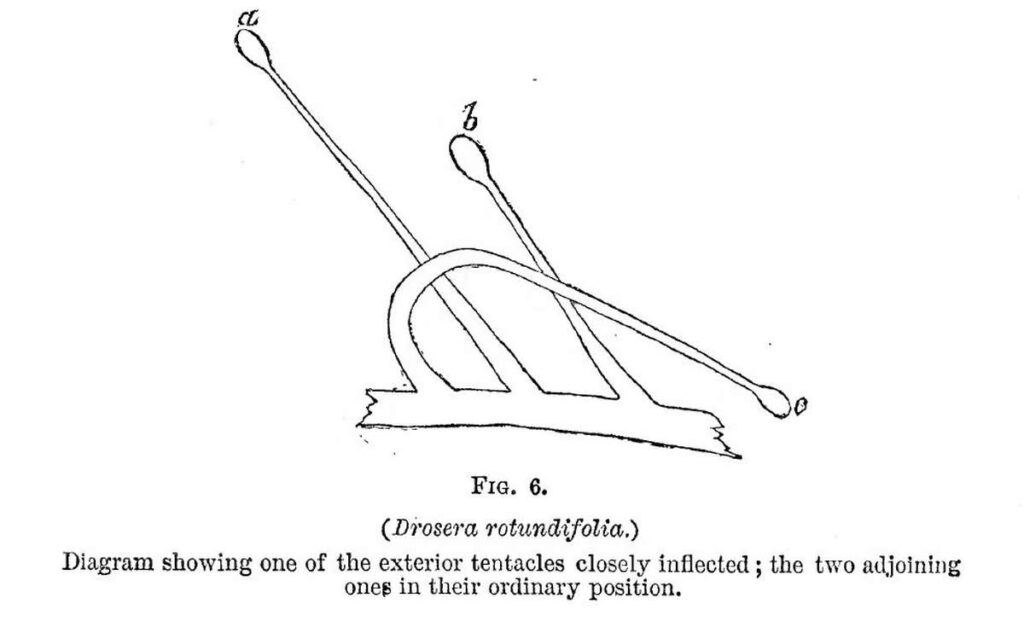
In four cases small particles of raw meat caused the tentacles to be greatly inflected in between 5 and 6 m. Another tentacle similarly treated, and observed with special care, distinctly, though slightly, changed its position in 10 s. (seconds); and this is the quickest movement seen by me.
In 2 m. 30 s. it had moved through an angle of about 45°. The movement as seen through a lens resembled that of the hand of a large clock. In 5 m. it had moved through 90°, and when I looked again after 10 m., the particle had reached the centre of the leaf; so that the whole movement was completed in less than 17 m. 30 s.
In the course of some hours this minute bit of meat, from having been brought into contact with some of the glands of the central disc, acted centrifugally on the outer tentacles, which all became closely inflected.
Fragments of flies were placed on the glands of four of the outer tentacles, extended in the same plane with that of the blade, and three of these fragments were carried in 35 m. through an angle of 180° to the centre. The fragment on the fourth tentacle was very minute, and it was not carried to the centre until 3 hrs. had elapsed.
In three other cases minute flies or portions of larger ones were carried to the centre in 1 hr. 30 s. In these seven cases, the fragments or small flies, which had been carried by a single tentacle to the central glands, were well embraced by the other tentacles after an interval of from 4 to 10 hrs.
I also placed in the manner just described six small balls of writing-paper (rolled up by the aid of pincers, so that they were not touched by my fingers) on the glands of six exterior tentacles on distinct leaves; three of these were carried to the centre in about 1 hr., and the other three in rather more than 4 hrs.; but after 24 hrs. only two of the six balls were well embraced by the other tentacles.
It is possible that the secretion may have dissolved a trace of glue or animalised matter from the balls of paper. Four particles of coal-cinder were then placed on the glands of four exterior tentacles; one of these reached the centre in 3 hrs. 40 m.; the second in 9 hrs.; the third within 24 hrs., but had moved only part of the way in 9 hrs.; whilst the fourth moved only a very short distance in 24 hrs., and never moved any farther.
Of the above three bits of cinder which were ultimately carried to the centre, one alone was well embraced by many of the other tentacles. We here see clearly that such bodies as particles of cinder or little balls of paper, after being carried by the tentacles to the central glands, act very differently from fragments of flies, in causing the movement of the surrounding tentacles.
I made, without carefully recording the times of movement, many similar trials with other substances, such as splinters of white and blue glass, particles of cork, minute bits of gold-leaf, &c.; and the proportional number of cases varied much in which the tentacles reached the centre, or moved only slightly, or not at all.
One evening, particles of glass and cork, rather larger than those usually employed, were placed on about a dozen glands, and next morning, after 13 hrs., every single tentacle had carried its little load to the centre; but the unusually large size of the particles will account for this result.
In another case 6/7 of the particles of cinder, glass, and thread, placed on separate glands, were carried towards, or actually to, the centre; in another case 7/9, in another 7/12, and in the last case only 7/26 were thus carried inwards, the small proportion being here due, at least in part, to the leaves being rather old and inactive.
Occasionally a gland, with its light load, could be seen through a strong lens to move an extremely short distance and then stop; this was especially apt to occur when excessively minute particles, much less than those of which the measurements will be immediately given, were placed on glands; so that we here have nearly the limit of any action.
I was so much surprised at the smallness of the particles which caused the tentacles to become greatly inflected that it seemed worth while carefully to ascertain how minute a particle would plainly act.
Accordingly measured lengths of a narrow strip of blotting paper, of fine cotton-thread, and of a woman’s hair, were carefully weighed for me by Mr. Trenham Reeks, in an excellent balance, in the laboratory in Jermyn Street. Short bits of the paper, thread, and hair were then cut off and measured by a micrometer, so that their weights could be easily calculated.
The bits were placed on the viscid secretion surrounding the glands of the exterior tentacles, with the precautions already stated, and I am certain that the gland itself was never touched; nor indeed would a single touch have produced any effect. A bit of the blotting-paper, weighing 1/465 of a grain, was placed so as to rest on three glands together, and all three tentacles slowly curved inwards; each gland, therefore, supposing the weight to be distributed equally, could have been pressed on by only 1/1395 of a grain, or .0464 of a milligramme.
Five nearly equal bits of cotton-thread were tried, and all acted. The shortest of these was 1/50 of an inch in length, and weighed 1/8197 of a grain. The tentacle in this case was considerably inflected in 1 hr. 30 m., and the bit of thread was carried to the centre of the leaf in 1 hr. 40 m. Again, two particles of the thinner end of a woman’s hair, one of these being 18/1000 of an inch in length, and weighing 1/35714 of a grain, the other 19/1000 of an inch in length, and weighing of course a little more, were placed on two glands on opposite sides of the same leaf, and these two tentacles were inflected halfway towards the centre in 1 hr. 10 m.; all the many other tentacles round the same leaf remaining motionless.
The appearance of this one leaf showed in an unequivocal manner that these minute particles sufficed to cause the tentacles to bend. Altogether, ten such particles of hair were placed on ten glands on several leaves, and seven of them caused the tentacles to move in a conspicuous manner. The smallest particle which was tried, and which acted plainly, was only 8/1000 of an inch (.203 millimetre) in length, and weighed the 1/78740 of a grain, or .000822 milligramme.
In these several cases, not only was the inflection of the tentacles conspicuous, but the purple fluid within their cells became aggregated into little masses of protoplasm, in the manner to be described in the next chapter; and the aggregation was so plain that I could, by this clue alone, have readily picked out under the microscope all the tentacles which had carried their light loads towards the centre, from the hundreds of other tentacles on the same leaves which had not thus acted.
My surprise was greatly excited, not only by the minuteness of the particles which caused movement, but how they could possibly act on the glands; for it must be remembered that they were laid with the greatest care on the convex surface of the secretion. At first I thought—but, as I now know, erroneously—that particles of such low specific gravity as those of cork, thread, and paper, would never come into contact with the surfaces of the glands.
The particles cannot act simply by their weight being added to that of the secretion, for small drops of water, many times heavier than the particles, were repeatedly added, and never produced any effect. Nor does the disturbance of the secretion produce any effect, for long threads were drawn out by a needle, and affixed to some adjoining object, and thus left for hours; but the tentacles remained motionless.
I also carefully removed the secretion from four glands with a sharply pointed piece of blotting-paper, so that they were exposed for a time naked to the air, but this caused no movement; yet these glands were in an efficient state, for after 24 hrs. had elapsed, they were tried with bits of meat, and all became quickly inflected.
It then occurred to me that particles floating on the secretion would cast shadows on the glands, which might be sensitive to the interception of the light. Although this seemed highly improbable, as minute and thin splinters of colourless glass acted powerfully, nevertheless, after it was dark, I put on, by the aid of a single tallow candle, as quickly as possible, particles of cork and glass on the glands of a dozen tentacles, as well as some of meat on other glands, and covered them up so that not a ray of light could enter; but by the next morning, after an interval of 13 hrs., all the particles were carried to the centres of the leaves.
These negative results led me to try many more experiments, by placing particles on the surface of the drops of secretion, observing, as carefully as I could, whether they penetrated it and touched the surface of the glands. The secretion, from its weight, generally forms a thicker layer on the under than on the upper sides of the glands, whatever may be the position of the tentacles.
Minute bits of dry cork, thread, blotting paper, and coal cinders were tried, such as those previously employed; and I now observed that they absorbed much more of the secretion, in the course of a few minutes, than I should have thought possible; and as they had been laid on the upper surface of the secretion, where it is thinnest, they were often drawn down, after a time, into contact with at least some one point of the gland.
With respect to the minute splinters of glass and particles of hair, I observed that the secretion slowly spread itself a little over their surfaces, by which means they were likewise drawn downwards or sideways, and thus one end, or some minute prominence, often came to touch, sooner or later, the gland.
In the foregoing and following cases, it is probable that the vibrations, to which the furniture in every room is continually liable, aids in bringing the particles into contact with the glands. But as it was sometimes difficult, owing to the refraction of the secretion, to feel sure whether the particles were in contact, I tried the following experiment.
Unusually minute particles of glass, hair, and cork, were gently placed on the drops round several glands, and very few of the tentacles moved. Those which were not affected were left for about half an hour, and the particles were then disturbed or tilted up several times with a fine needle under the microscope, the glands not being touched.
And now in the course of a few minutes almost all the hitherto motionless tentacles began to move; and this, no doubt, was caused by one end or some prominence of the particles having come into contact with the surface of the glands. But as the particles were unusually minute, the movement was small.
Lastly, some dark blue glass pounded into fine splinters was used, in order that the points of the particles might be better distinguished when immersed in the secretion; and thirteen such particles were placed in contact with the depending and therefore thicker part of the drops round so many glands.
Five of the tentacles began moving after an interval of a few minutes, and in these cases I clearly saw that the particles touched the lower surface of the gland. A sixth tentacle moved after 1 hr. 45 m., and the particle was now in contact with the gland, which was not the case at first.
So it was with the seventh tentacle, but its movement did not begin until 3 hrs. 45 m. had elapsed. The remaining six tentacles never moved as long as they were observed; and the particles apparently never came into contact with the surfaces of the glands.
From these experiments we learn that particles not containing soluble matter, when placed on glands, often cause the tentacles to begin bending in the course of from one to five minutes; and that in such cases the particles have been from the first in contact with the surfaces of the glands.
When the tentacles do not begin moving for a much longer time, namely, from half an hour to three or four hours, the particles have been slowly brought into contact with the glands, either by the secretion being absorbed by the particles or by its gradual spreading over them, together with its consequent quicker evaporation.
When the tentacles do not move at all, the particles have never come into contact with the glands, or in some cases the tentacles may not have been in an active condition. In order to excite movement, it is indispensable that the particles should actually rest on the glands; for a touch once, twice, or even thrice repeated by any hard body is not sufficient to excite movement.
Another experiment, showing that extremely minute particles act on the glands when immersed in water, may here be given. A grain of sulphate of quinine was added to an ounce of water, which was not afterwards filtered; and on placing three leaves in ninety minims of this fluid, I was much surprised to find that all three leaves were greatly inflected in 15 m.; for I knew from previous trials that the solution does not act so quickly as this.
It immediately occurred to me that the particles of the undissolved salt, which were so light as to float about, might have come into contact with the glands, and caused this rapid movement. Accordingly I added to some distilled water a pinch of a quite innocent substance, namely, precipitated carbonate of lime, which consists of an impalpable powder; I shook the mixture, and thus got a fluid like thin milk.
Two leaves were immersed in it, and in 6 m. almost every tentacle was much inflected. I placed one of these leaves under the microscope, and saw innumerable atoms of lime adhering to the external surface of the secretion. Some, however, had penetrated it, and were lying on the surfaces of the glands; and no doubt it was these particles which caused the tentacles to bend.
When a leaf is immersed in water, the secretion instantly swells much; and I presume that it is ruptured here and there, so that little eddies of water rush in. If so, we can understand how the atoms of chalk, which rested on the surfaces of the glands, had penetrated the secretion.
Anyone who has rubbed precipitated chalk between his fingers will have perceived how excessively fine the powder is. No doubt there must be a limit, beyond which a particle would be too small to act on a gland; but what this limit is, I know not. I have often seen fibres and dust, which had fallen from the air, on the glands of plants kept in my room, and these never induced any movement; but then such particles lay on the surface of the secretion and never reached the gland itself.
Finally, it is an extraordinary fact that a little bit of soft thread, 1/50 of an inch in length and weighing 1/8197 of a grain, or of a human hair, 8/1000 of an inch in length and weighing only 1/78740 of a grain (.000822 milligramme), or particles of precipitated chalk, after resting for a short time on a gland, should induce some change in its cells, exciting them to transmit a motor impulse throughout the whole length of the pedicel, consisting of about twenty cells, to near its base, causing this part to bend, and the tentacle to sweep through an angle of above 180°.
That the contents of the cells of the glands, and afterwards those of the pedicels, are affected in a plainly visible manner by the pressure of minute particles, we shall have abundant evidence when we treat of the aggregation of protoplasm.
But the case is much more remarkable than as yet stated; for the particles are supported by the viscid and dense secretion; nevertheless, even smaller ones than those of which the measurements have been given, when brought by an insensibly slow movement, through the means above specified, into contact with the surface of a gland, act on it, and the tentacle bends.
The pressure exerted by the particle of hair, weighing only 1/78740 of a grain and supported by a dense fluid, must have been inconceivably slight. We may conjecture that it could hardly have equalled the millionth of a grain; and we shall hereafter see that far less than the millionth of a grain of phosphate of ammonia in solution, when absorbed by a gland, acts on it and induces movement.
A bit of hair, 1/50 of an inch in length, and therefore much larger than those used in the above experiments, was not perceived when placed on my tongue; and it is extremely doubtful whether any nerve in the human body, even if in an inflamed condition, would be in any way affected by such a particle supported in a dense fluid, and slowly brought into contact with the nerve. Y
et the cells of the glands of Drosera are thus excited to transmit a motor impulse to a distant point, inducing movement. It appears to me that hardly any more remarkable fact than this has been observed in the vegetable kingdom.
The Inflection of the Exterior Tentacles, when their Glands are excited by Repeated Touches
We have already seen that, if the central glands are excited by being gently brushed, they transmit a motor impulse to the exterior tentacles, causing them to bend; and we have now to consider the effects which follow from the glands of the exterior tentacles being themselves touched. On several occasions, a large number of glands were touched only once with a needle or fine brush, hard enough to bend the whole flexible tentacle; and though this must have caused a thousand-fold greater pressure than the weight of the above described particles, not a tentacle moved. On another occasion forty-five glands on eleven leaves were touched once, twice, or even thrice, with a needle or stiff bristle. This was done as quickly as possible, but with force sufficient to bend the tentacles; yet only six of them became inflected,—three plainly, and three in a slight degree. In order to ascertain whether these tentacles which were not affected were in an efficient state, bits of meat were placed on ten of them, and they all soon became greatly incurved. On the other hand, when a large number of glands were struck four, five, or six times with the same force as before, a needle or sharp splinter of glass being used, a much larger proportion of tentacles became inflected; but the result was so uncertain as to seem capricious. For instance, I struck in the above manner three glands, which happened to be extremely sensitive, and all three were inflected almost as quickly, as if bits of meat had been placed on them. On another occasion I gave a single forcible touch to a considerable number of glands, and not one moved; but these same glands, after an interval of some hours, being touched four or five times with a needle, several of the tentacles soon became inflected.
The fact of a single touch or even of two or three touches not causing inflection must be of some service to the plant; as during stormy weather, the glands cannot fail to be occasionally touched by the tall blades of grass, or by other plants growing near; and it would be a great evil if the tentacles were thus brought into action, for the act of re-expansion takes a considerable time, and until the tentacles are re-expanded they cannot catch prey.
On the other hand, extreme sensitiveness to slight pressure is of the highest service to the plant; for, as we have seen, if the delicate feet of a minute struggling insect press ever so lightly on the surfaces of two or three glands, the tentacles bearing these glands soon curl inwards and carry the insect with them to the centre, causing, after a time, all the circumferential tentacles to embrace it.
Nevertheless, the movements of the plant are not perfectly adapted to its requirements; for if a bit of dry moss, peat, or other rubbish, is blown on to the disc, as often happens, the tentacles clasp it in a useless manner. They soon, however, discover their mistake and release such innutritious objects.
It is also a remarkable fact, that drops of water falling from a height, whether under the form of natural or artificial rain, do not cause the tentacles to move; yet the drops must strike the glands with considerable force, more especially after the secretion has been all washed away by heavy rain; and this often occurs, though the secretion is so viscid that it can be removed with difficulty merely by waving the leaves in water.
If the falling drops of water are small, they adhere to the secretion, the weight of which must be increased in a much greater degree, as before remarked, than by the addition of minute particles of solid matter; yet the drops never cause the tentacles to become inflected.
It would obviously have been a great evil to the plant (as in the case of occasional touches) if the tentacles were excited to bend by every shower of rain; but this evil has been avoided by the glands either having become through habit insensible to the blows and prolonged pressure of drops of water, or to their having been originally rendered sensitive solely to the contact of solid bodies.
We shall hereafter see that the filaments on the leaves of Dionaea are likewise insensible to the impact of fluids, though exquisitely sensitive to momentary touches from any solid body.
When the pedicel of a tentacle is cut off by a sharp pair of scissors quite close beneath the gland, the tentacle generally becomes inflected. I tried this experiment repeatedly, as I was much surprised at the fact, for all other parts of the pedicels are insensible to any stimulus.
These headless tentacles after a time re-expand; but I shall return to this subject. On the other hand, I occasionally succeeded in crushing a gland between a pair of pincers, but this caused no inflection. In this latter case the tentacles seem paralysed, as likewise follows from the action of too strong solutions of certain salts, and by too great heat, whilst weaker solutions of the same salts and a more gentle heat cause movement.
We shall also see in future chapters that various other fluids, some vapours, and oxygen (after the plant has been for some time excluded from its action), all induce inflection, and this likewise results from an induced galvanic current.*
* My son Francis, guided by the observations of Dr. Burdon Sanderson on Dionaea, finds that if two needles are inserted into the blade of a leaf of Drosera, the tentacles do not move; but that if similar needles in connection with the secondary coil of a Du Bois inductive apparatus are inserted, the tentacles curve inwards in the course of a few minutes. My son hopes soon to publish an account of his observations.
More Chapters from Insectivorous Plants by Charles Darwin
Insectivorous Plants Table of Contents
Previous – Chapter 1: Drosera Rotundifolia, or the Common Sun-dew
Up next – Chapter 3: Aggregation of the Protoplasm Within the Cells of the Tentacles

